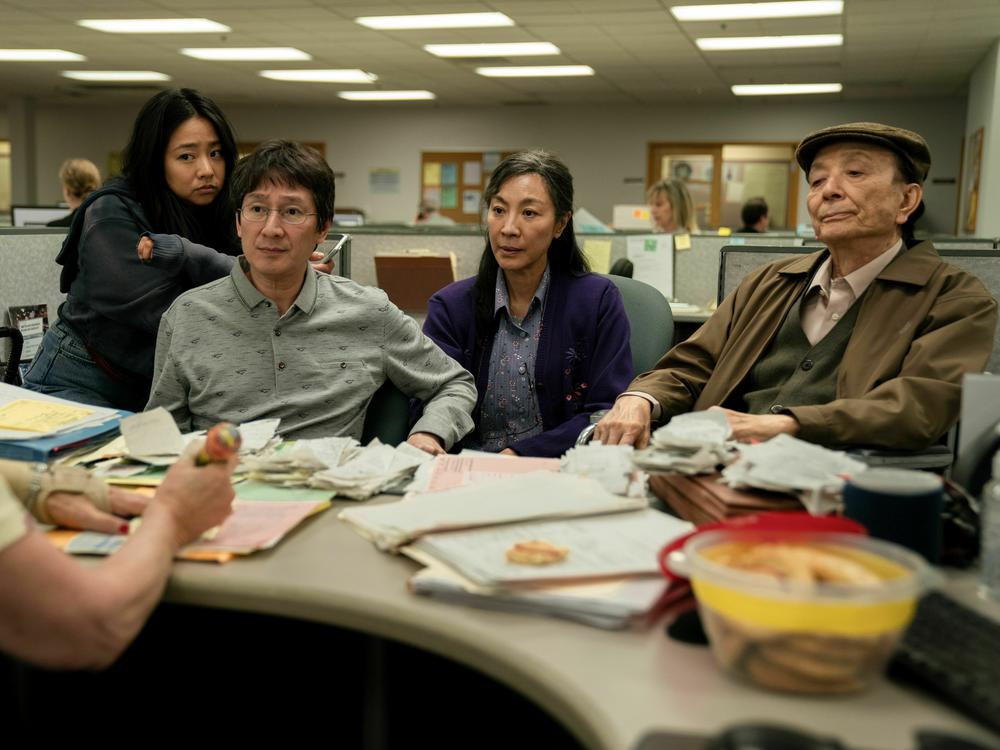Section Branding
Header Content
5 takeaways from the Oscar nominations
Primary Content
The Oscar nominations were announced Tuesday morning, and while many of them were largely as expected, there were some great inclusions that cheered fans of films from Aftersun, whose lead Paul Mescal received a best actor nomination, to Top Gun: Maverick, which was the rare traditional summer blockbuster to earn a best picture nomination. There were also some omissions that pained fans of individual artists as well as advocates for greater inclusivity in the Oscars. Let's take a look at some of the headlines.
War movies are still a solid path to awards
The German adaptation of All Quiet on the Western Front, which is available on Netflix, is not breaking a lot of new ground as a war film for people who have seen the bloodiest sequences in Saving Private Ryan and the trench warfare of 1917. It showed at the Toronto International Film Festival in the fall to positive but not necessarily wildly enthusiastic reviews. Nevertheless, it received nine nominations, including best picture, best international feature, and best adapted screenplay. There's a long history of the Oscars loving brutal depictions of young men at war, and it goes on.
Everything Everywhere All at Once is an unconventional frontrunner
If the Oscars have a longstanding love affair with war movies, they have no particular history with anything recalling Everything Everywhere All at Once, the multiverse-spanning, idiosyncratic family story that leads the nominations with 11. Four acting nominations — for lead actress Michelle Yeoh, supporting actresses Stephanie Hsu and Jamie Lee Curtis, and supporting actor Ke Huy Quan — plus best picture, best directing, best original screenplay, best costumes and music and visual effects and editing, all add up to a huge haul for a movie that isn't quite like anything anybody has ever seen before.
Yes, you can still run a small-budget campaign and get a nomination
A few weeks ago, glowing mentions of Andrea Riseborough's performance in the low-budget drama To Leslie, which got glowing reviews for her work and good reviews overall when it came out in October, began to grow. But it wasn't on most awards radar, and then it was, as theories swirled about what connections might be behind the swell of support. And now, Riseborough has her nomination.
The complexity of this successful underdog campaign is that it's easy to see it as taking places in the list that could have gone to a couple of highly regarded performances of Black actresses, especially Viola Davis in The Woman King and Danielle Deadwyler in Till. But Riseborough is occupying no more space than, for instance, Ana de Armas in Blonde or Michelle Williams in The Fabelmans, neither of which was a performance that was universally praised, and both of which were undoubtedly supported by campaigns that are just as aggressive as anything that happened on Twitter. Those campaigns are based on access to funding rather than connections; both can result in exclusion and inclusion based on factors other than merit.
But you should expect that seeing one low-budget campaign like this succeed — not the first, but perhaps the first that played out so publicly on social media — will lead to more.
First-time nominees in the acting categories are everywhere
Out of 20 total nominees in the four acting categories, 16 are nominated for the first time. Only Cate Blanchett, Michelle Williams, Judd Hirsch and Angela Bassett are veterans. First-time nominees include new faces like Austin Butler (Elvis) and Stephanie Hsu (Everything Everywhere All at Once), but also familiar veterans like Colin Farrell and Brendan Gleeson (The Banshees of Inisherin) and Bill Nighy (Living). Plus, of course, the comeback stories of Ke Huy Quan (Everything Everywhere All at Once) and Brendan Fraser (The Whale).
No women directors ... again, and an #OscarsSoWhite update
Women have won the last two best director Oscars (Chloe Zhao for Nomadland and then Jane Campion for Power of the Dog). But as has been the case in many, many years of Oscar nominations, no women were nominated this year, despite strong films from established directors including Gina Prince-Bythewood (The Woman King) and Sarah Polley (Women Talking, which was nominated for best picture).
It was also a difficult year for some of the most well-regarded Black artists in Hollywood. On top of the overlooking of Davis and Deadwyler and the films they starred in, Jordan Peele's horror film Nope was shut out of the nominations entirely. While it hasn't had the impact of best picture nominee Get Out, Nope is provocative and inventive, and a complete shutout is disappointing. While Angela Bassett became the first actor nominated for a Marvel movie (for Black Panther: Wakanda Forever) and the hugely versatile Brian Tyree Henry was nominated for Causeway, the #OscarsSoWhite discussions of recent years are far from over.
Copyright 2023 NPR. To see more, visit https://www.npr.org.
Bottom Content

